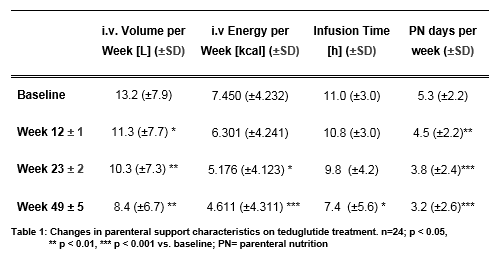Introduction: Teduglutide (TED) is a medical treatment for intestinal functional rehabilitation of short bowel syndrome (SBS) patients with chronic intestinal failure (cIF). Its application and effectivity is routinely monitored in a structured home care service program by a multicentric approach in Germany. From these prospectively documented data, a retrolective data base was generated in order to study treatment characteristics and outcome parameters in a clinical routine setting of TED-treated cIF-patients.
Methods: For the present interim analysis, prospectively collected clinical data until December 2018 were retrolectively analyzed. Statistical analyses were performed with SPSS using repeated measures ANOVA and Friedman-Test with subsequent Bonferroni-adjusted post-hoc analyses for TED treatment characteristics up to one year.
Results: So far, 29 patients (f:17 / m:12, median age 52 years) were included in this interim analysis. Causes of SBS included vascular (n=12) and inflammatory diseases (n=6), ileus (n=4), injury (n=4) and others (n=3). Median time on parenteral support (PS) before TED was 30 months. At TED start, 72% of patients (21/29) received individually compounded parenteral nutrition (PN); the remaining 28% received standardized PN. PS was administered by patients themselves (n=15), by relatives (n=3), by nurses (n=8) or others (n=3). TED treatment resulted in a significant reduction in PN calories and volume requirements as well as reduced infusion days per week and shortened infusion times (see Table 1).

The reduction of infusion time was positively correlated with the reduction of PN volume (p<0.001; r=0.75) and calories (p=0.003; r=0.59) after one year of TED treatment. After one year, 22 of 29 (76%) patients were considered responders to TED treatment (with a minimum of 20% i.v.-volume reduction).
Conclusion: In this multicentric real-world analysis of severely PS-dependent SBS/cIF-patients, TED displays effectivity with regards to improvement of intestinal absorptive function as indicated by significantly reduced weekly i.v.-volume and calorie requirements. In addition, the findings demonstrate a reduction of effective infusion days and times, which both importantly affect patients’ wellbeing. These data indicate the effectivity of TED treatment in a national routine treatment setting in concordance with clinical trial data and guideline recommendations.
.jpg )